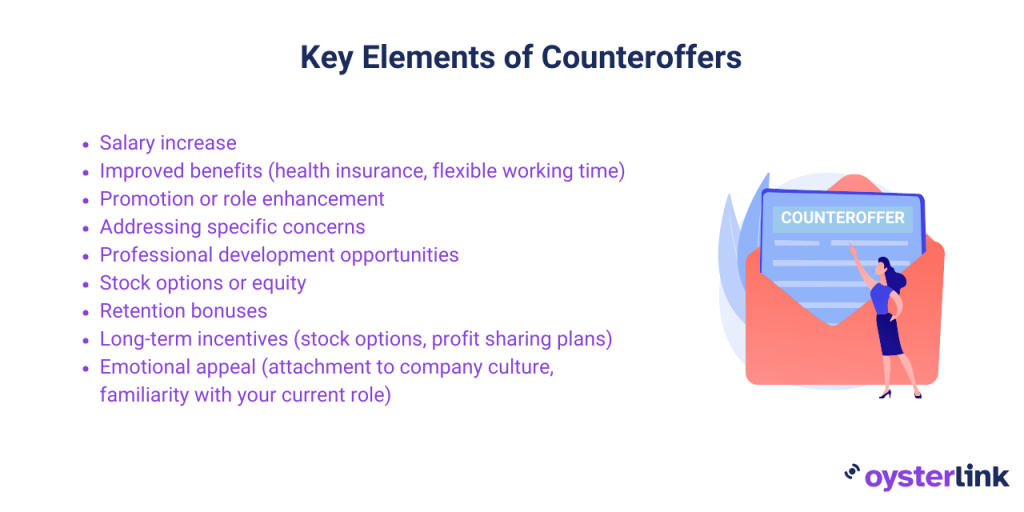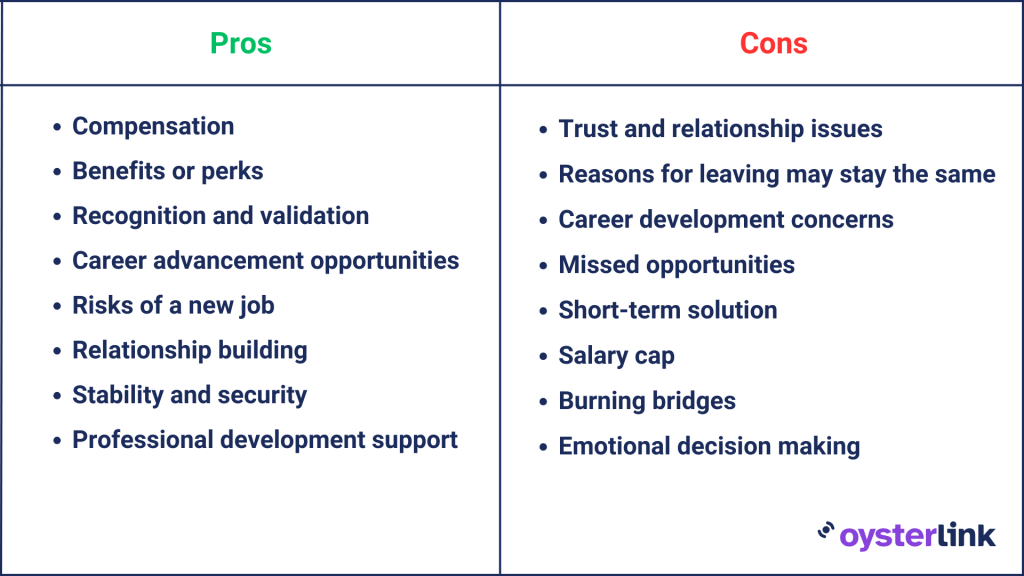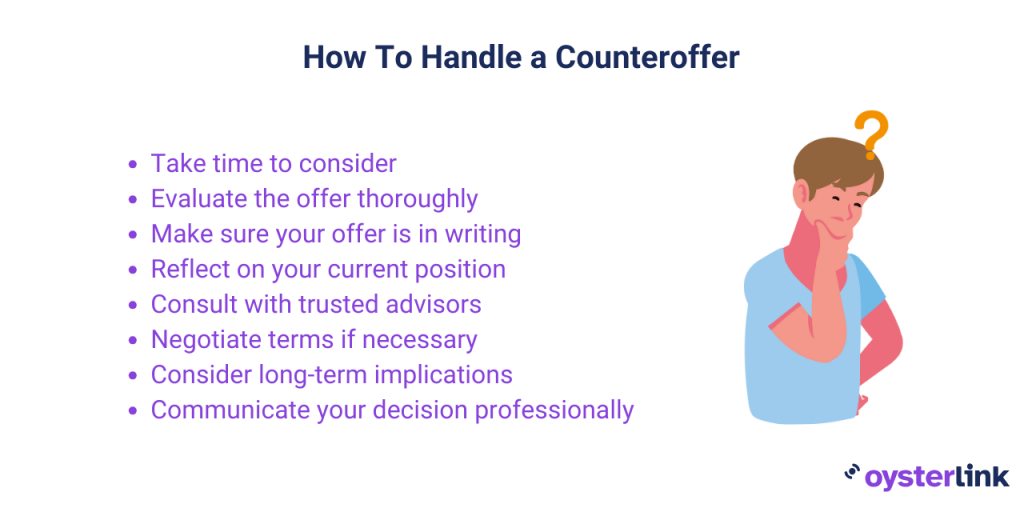You’ve been eyeing new career horizons, and after months of applying, you finally get an offer from a new company.
But just as you’re about to take the leap and send your resignation email, your current employer presents a counteroffer.
It’s an unexpected turn in your career journey, one that leaves you with a question: Should you accept the counteroffer?
In this article, we’ll cover the pros and cons of accepting a counteroffer, how to handle them and why employers make them in the first place.
What Is a Counteroffer?
A counteroffer is a proposal from your current employer upon discovering your intention to leave for another job opportunity. To retain you, they might propose various additional benefits.
Key elements of a counteroffer includes:
- Salary increase
- Improved benefits (health insurance, flexible working time)
- Promotion or role enhancement
- Addressing specific concerns
- Professional development opportunities
- Stock options or equity
- Retention bonuses
- Long-term incentives (stock options, profit-sharing plans)
- Emotional appeal (attachment to company culture, familiarity with your current role)

Accepting a Counteroffer [Pros and Cons]
Accepting a counteroffer can have several advantages or disadvantages. While it might address your reasons for considering a job change in the first place, it could also lead to potential drawbacks in your career.
Here are some of the key pros and cons of accepting a counteroffer:
Pros
- Compensation: Often, the most immediate benefit of a counteroffer is a higher salary. If financial gain is a primary motivator for your job change, a counteroffer that meets or exceeds the competing offer can be a significant advantage.
- Benefits or perks: Along with salary, counteroffers may include better benefits, such as enhanced health insurance, additional vacation days or flexible working hours.
- Recognition and validation: A counteroffer can be a sign that your current employer highly values your contributions. This recognition can feel affirming, as it indicates that your work has made an impact.
- Career advancement opportunities: Sometimes, a counteroffer includes a promotion or a promise of a more significant role in the company. This can accelerate your career growth and provide new challenges and responsibilities.
- Familiar environment: Staying with your current employer means avoiding the uncertainties that come with a new workplace. You already understand the company culture, know your colleagues and are familiar with the job’s expectations and challenges.
- Relationship building: Remaining with your current employer allows you to maintain relationships and networks that you’ve established. This can be particularly beneficial if you have strong connections that could lead to future opportunities or mentorships.
- Stability and security: If you have concerns about possible layoffs, staying put might offer more job security and peace of mind, especially if you have established a good track record with your current employer.
- Professional development support: Some counteroffers include commitments to professional development, such as training programs, workshops or further education, which can be valuable for long-term growth.
Cons
Given that approximately 90% of employees who accept a counteroffer leave their company within the same year, this statistic raises concerns about the potential downsides of such decisions.
The most common cons of accepting a counteroffer are:
- Trust and relationship issues: Your current employer may now view you as someone who considered leaving and might do so again. This can lead to trust issues and might affect your dynamic with your employer and colleagues.
- Original reasons for leaving may stay the same: The factors that initially prompted your decision to leave — such as workplace culture or lack of recognition — might remain unaddressed, leading to ongoing dissatisfaction.
- Career development concerns: There might be a perception that your commitment to the company is wavering, which could impact future opportunities for promotions or involvement in significant projects.
- Missed opportunities: By accepting a counteroffer and staying, you might be missing out on a valuable opportunity for growth, new experiences and a better overall situation with another employer.
- Short-term solution: Some employers make counteroffers as a temporary measure to keep you on board while they look for a replacement, which can put your job security at risk in the long term.
- Salary cap: The increase in salary or benefits you gain from a counteroffer might limit future pay raises, as you might already be at the higher end of the pay scale for your role.
- Burning bridges: If you initially accepted an offer with another company and then retracted it in favor of a counteroffer, this could harm your professional reputation with the other employer and within your industry network.
- Emotional decision making: The decision to stay, often influenced by immediate emotions or the comfort of familiarity, can result in overlooking long-term career goals and overall job satisfaction. This emotional response may lead to a hasty acceptance of the counteroffer without fully considering its long-term impact.
- Unfulfilled promises: Sometimes, the promises made in a counteroffer are not always upheld, which can lead to regret for having declined a new opportunity.

How To Handle a Counteroffer
In 57% of cases, employees accept a counteroffer. This decision can be tempting — especially if it includes a higher salary, better benefits or a more senior role.
However, this decision is not just about immediate gains — it’s also about your long-term career trajectory and personal satisfaction.
Here are some key steps to take in mind:
1. Take Time to Consider
Don’t feel pressured to respond immediately. Request a reasonable amount of time such as two or three days to think about the counteroffer. This gives you space to weigh the pros and cons objectively.
2. Evaluate the Offer Thoroughly
Evaluate the specifics of the counteroffer. Consider not just the salary, but also other benefits like bonuses, stock options, work-life balance, job responsibilities and career growth opportunities.
3. Make Sure Your Offer Is in Writing
It’s equally important to ensure that the counteroffer is provided in writing. A formal written offer helps to clarify and legally substantiate the terms of the agreement, safeguarding your interests and providing a clear reference for future discussions or negotiations.
4. Reflect on Your Current Position
Revisit the reasons why you decided to leave. Are these issues adequately addressed in the counteroffer? For example, you might receive a salary increase, but this doesn’t necessarily resolve other concerns such as workplace culture, long commute times, or limited opportunities for advancement.
5. Consult With Trusted Advisors
Seek advice from mentors, industry peers or career coaches. They can provide an outside perspective and help you weigh the counteroffer against your career goals and personal values.
However, discussing the counteroffer with colleagues or teammates at your current company can be a delicate subject.
It may create workplace tension or lead to conflicts of interest, as these individuals might have their own biases or concerns about how your decision could affect them or the team dynamics. Therefore, it’s generally advisable to seek advice from those outside your immediate work circle.
6. Negotiate Terms if Necessary
If the counteroffer is close to what you’re looking for but not quite there, feel free to negotiate. Be clear about what would make the offer more appealing to you, whether it’s a higher salary, more flexible hours or additional responsibilities.
7. Consider Long-Term Implications
Think about how accepting or declining the counteroffer will affect your career in the long run. Will staying at your current company offer you growth and learning opportunities? Or is the new opportunity more aligned with your career path?
8. Communicate Your Decision Professionally
Whether you accept or decline the job counteroffer, do it with professionalism. If you accept, ensure clear communication about your expectations and any agreed-upon changes. If you decline, make sure you leave on good terms by expressing gratitude and maintaining a positive tone.

Why Do Employers Make Counteroffers?
Employers often make counteroffers to retain valuable employees and to avoid disruptions associated with hiring and training new staff.
The most common reasons why employers make counteroffers are:
1. Hiring Costs
Employers make counter offers because most of the time the expenses involved in finding and training a new hire often exceed the cost of the raise offered.
For example, if you’re an Event Manager at a large hotel responsible for organizing major conferences, your sudden departure could jeopardize upcoming high-profile events. The cost and time involved in finding and training someone new, who can manage these events with the same expertise, often make a counteroffer more appealing for the employer.
2. Business Continuity
An employee’s departure can disrupt ongoing projects and operations. By making a counteroffer, employers aim to maintain continuity in their workforce and projects, avoiding the downtime associated with finding and training a replacement.
For instance, you’re the Event Manager at a large hotel who is responsible for organizing major conferences. Your sudden departure might leave a series of upcoming high-profile events in jeopardy.
3. Talent Retention
In many industries, there’s a limited pool of talent with specific skills or experience. Employers may make a counteroffer to retain an employee with highly valuable skills that are hard to replace.
For example, you’re a renowned Pastry Chef in a boutique hotel, famous for your award-winning desserts. Realizing your unique talent is irreplaceable, the hotel might present a counteroffer including a substantial salary increase and creative control over the dessert menu.
4. Market Dynamics
In candidate-led markets, where the demand for skilled professionals exceeds the supply, employers are more inclined to make counter offers to prevent valuable employees from joining competitors.
As a top Sales Executive who has significantly boosted occupancy rates, you’ve received an offer from a rival hotel chain. Your current employer, recognizing your vital role in their revenue generation, might counter with an offer that includes a significant bonus for meeting sales targets.
5. Employee’s Potential and Value
Sometimes, an employer may not have realized the employee’s dissatisfaction or value until they resign. A counteroffer can be a way for employers to rectify this by recognizing and rewarding the employee’s contributions.
Suppose you’re a Front Desk Supervisor who implemented an efficient check-in process that has significantly improved guest satisfaction ratings. Upon your resignation, the hotel might offer you a promotion to Front Office Manager, a raise and a budget to implement your innovative ideas across other branches.
6. Team Dynamic
The departure of an employee, especially in a critical role, can lead to a significant disruption in the workflow and may affect team morale. Employers might make a counteroffer to avoid such disruption and maintain team stability.
If you’re the Head Housekeeper responsible for maintaining the hotel’s high standards, your departure could affect the entire housekeeping operation. The hotel might counter your new job offer with a salary increase, additional support staff and a more flexible schedule to accommodate your personal commitments.
7. Short-Term Solutions
In some cases, employers use counteroffers as a short-term solution to retain the employee while they search for a replacement or restructure the team. This can be a strategic move to ensure business operations are not immediately affected by the departure.
As the Head of Maintenance, your expertise in maintaining the hotel’s facilities is unmatched. If you decide to leave, the hotel might offer a counter with a significant raise and a bonus as a temporary measure while they search for someone with similar skills, ensuring maintenance standards are not compromised.
8. Internal Benchmarking
Employers may also use counteroffers as a tool for internal benchmarking. By understanding what other companies are willing to offer, they can adjust their compensation and benefits packages to be more competitive in the market.
For example, imagine you’re a Bar Manager who has transformed the hotel’s bar into a local hotspot. Hearing about your offer from a high-end establishment, your hotel might counter with an improved package, including a higher salary, a share in the bar’s profits and an expense account for experimenting with new recipes.
Frequently Asked Questions About Should You Accept a Counteroffer
How much is a reasonable counteroffer salary-wise?
Employers typically counteroffer with an increase in the range of 10% to 20% above the current salary. This percentage can vary based on factors like the employee’s value to the company, market demand and the employer’s budget constraints.
Can you lose a counteroffer if you negotiate?
Yes, there is a risk of losing a counteroffer if you enter negotiations. It’s important to recognize this possibility and be prepared to either walk away or compromise.
Consequently, you should approach negotiation with care, as overly aggressive or unrealistic demands can lead to the withdrawal of the initial offer. To mitigate these risks, it’s important to research thoroughly to understand market rates and reasonable salary ranges.
How do you politely decline a counteroffer?
Declining a counteroffer politely and professionally is crucial to maintaining a positive relationship with your current employer.
Here are tips on how to do it:
- Express gratitude: Begin by expressing your appreciation for the counteroffer. Acknowledge the effort and consideration your employer has shown in making the offer.
- Be clear and concise: Clearly state your decision to decline the offer. It’s important to be direct yet tactful to avoid any misunderstandings.
- Provide a reason (if you’re comfortable): You can also briefly mention your reason for declining the offer. This could be related to career growth, a different opportunity aligning more with your goals or personal reasons.
- Maintain professionalism: Use a respectful and professional tone throughout the conversation. Avoid negative comments about the company or the offer itself.
- Leave the door open: End on a positive note, expressing your desire to keep the relationship amicable and potentially collaborate in the future.
Navigate Your Career Path Wisely With OysterLink
Understanding the details of accepting a counteroffer is a critical aspect of career progression, especially in the dynamic environment of the hospitality industry. OysterLink is committed to equipping you with essential insights and resources, ensuring that you don’t just excel in your current role, but also make well-informed decisions when contemplating counteroffers.
Our Spotlight section offers in-depth resources on the hospitality industry, including:
- Current salary trends to ensure competitive compensation
- Detailed job descriptions for precise candidate fit
- Effective interview strategies
- Industry trends
Our platform not only connects you with leading employers in the industry but also equips you with critical insights for advancing your career.
Join OysterLink to unlock these resources and make well-informed choices about your job offers. Enhance your career prospects and become proactive in navigating the restaurant and hospitality job market.









